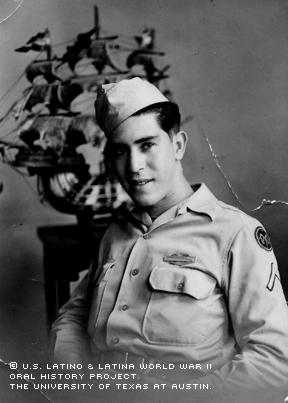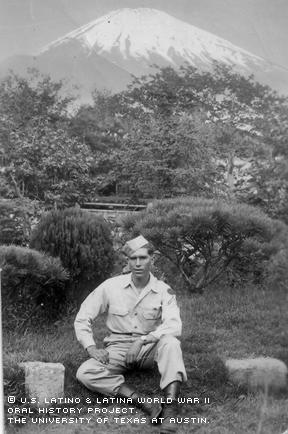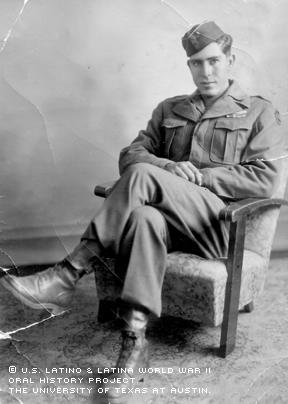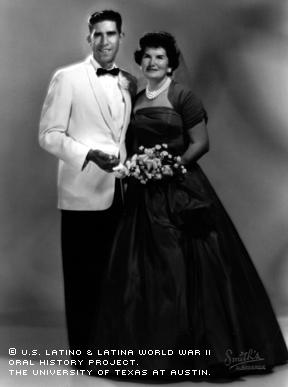



By Nicole Dreyer
As a ranch hand, Cresencio Lopez didn't get much news about what was happening overseas in World War II. Some neighbors and his cousin had been drafted, and it was hard to get information from them. Later, when Lopez was serving in the Pacific at the tail end of the war, he’d write often to his mother and wife, letting them know where he was and inquiring about his family.
Lopez was born in the village of Moqino, about 45 miles west of Albuquerque, N.M. After his father died in a coal mining accident when Lopez was 3, he was raised by his grandparents on their cattle ranch near Grants. By the time he was 8, Lopez says, he was a professional horseback rider.
"I was real happy doing that kind of work," said Lopez, recalling the long days and nights on the range. "My granddad used to have to tie me to the saddle of the horse because I would go to sleep out there. I fell off one night."
Lopez says he was more interested in raising cattle and breaking horses than going to school. He attended 11th grade, but couldn't finish because he was too busy at the ranch. "I never thought I would need it anyway," he said. "Of course, I was mistaken."
He married Trinidad Chavez on May 11, 1942, when he was 19 years old. They had three daughters: Pearline, Frieda and Gloria.
Lopez was drafted on Sept. 7, 1944. He was assigned to the 10th Army, 27th Infantry Division. Though he only saw five months of action during 1945, part of which he spent in Okinawa, Lopez says his battle experiences were fierce and haunting.
He was in Okinawa from April 1, 1945, until the middle of August, 1945.
He says he’s scarred by the images and memories of friends being killed by artillery fire. He remembers carrying a 9-year-old Japanese girl for 13 miles to a military field hospital.
"It's not worth it," he said. "I don't like to talk about it. But we all got used to it back then. In the front lines, you're not afraid of anything."
He remembers one time when he was lying in a foxhole when a Japanese soldier approached him from behind with a bayonet. It was raining and the ground was muddy and slippery.
"I flew out of my foxhole and hit him with the butt of my gun," he said. "He was knocked down and I was glad it was him instead of me. Then I stuck him in the side but didn't have time to move him out of the way."
Japanese soldiers fired at Lopez. But their bullets struck the Japanese soldier he’d stabbed on the ground above his foxhole. He remembers being hit in the face by pieces of flesh and blood from the dead Japanese soldier.
"A couple of days later, we hadn't moved, and I was still in that foxhole, and with [rain] water up to my chest," he recalled.
The body was so decomposed by then; the smell was really bad, and beetles and maggots were crawling in and out of the corpse.
“I couldn't go anywhere but just kept bailing water with my helmet," Lopez said.
At night, Lopez said he could clean up a little bit but was basically "living in that hole, just like a hog." Four or five days later, his commander gave orders to move out.
Lopez says he was stricken a couple of days later with a form of malaria. He received medical treatment and was sent back the next day to the frontlines.
"I was sick all the time," he said. "But you couldn't say you were sick because they needed you."
Lopez credits President Harry S. Truman with ending the war and saving his life by ordering the atomic bomb attacks on Hiroshima and Nagasaki.
In written comments to the project after the interview, Lopez explained that the Americans and Japanese continued fighting after the bombing.
"The Japanese did not surrender until around 2 in the afternoon August the 14th, 1945," he said. "By that time we have fought to the end. On the 14th day of August, we were still fighting in the front lines, when we heard radios and sirens telling us to cease fire -- that the war had ended. I remember a bunch of us guys embraced and threw our helmets up in the air "Thank God!" and sang and cried.
"Our mission is finished," he wrote. "We're coming home."
In January of 1946, Lopez flew to Tokyo from the Japanese island of Hokaido, where he joined soldiers from New Mexico, Texas and Arizona aboard a ship headed to the United States mainland.
"You should have seen these guys when we landed," he recalled about their return to the U.S mainland. "They opened the big gates on the ship and they ran out, got down on their bellies and just started kissing the ground like it was the sweetest thing in the world."
When he returned home, Lopez resumed ranching until the early 1950s, when a drought forced him to sell much of his cattle. He eventually became an electrician in uranium mines in New Mexico. He retired after 20 years, in 1984.
These days, Lopez says he needs to stay busy. He has set up a shop in his house to do woodwork and often does electrical work in town -- anything to keep his mind occupied.
"If I stay in the house or I'm just not doing anything, I'm thinking about what happened to me on the frontlines when I was in the service, and I don't like that," he said.
Lopez says the war taught him how to make a better life for himself.
"Before, we thought there was no other world than the one we were living in, in our small towns," he said. "Now, I know, there is no better country than the U.S. When I was on the front lines, we were all fighting for the American flag."
Mr. Lopez was interviewed in Albuquerque, New Mexico, on November 12, 2002, by Brian Lucero.

